Finally, we’re back to Lucy. She’s still riding through the forest and now another Telmarine soldier is chasing her. Suddenly, there’s a lion running beside her too. Is it Aslan or is it some random lion who’s going to kill her? OK, it’s obviously going to be Aslan but let’s bear with the movie and pretend that, like Lucy, we’re not sure yet. (To be fair, this at the tail-end of a rather overindulgent action scene so it doesn’t feel so a random lion attacking doesn’t feel so unlikely in context.) The lion roars, frightening her horse who rears back, knocking Lucy off.
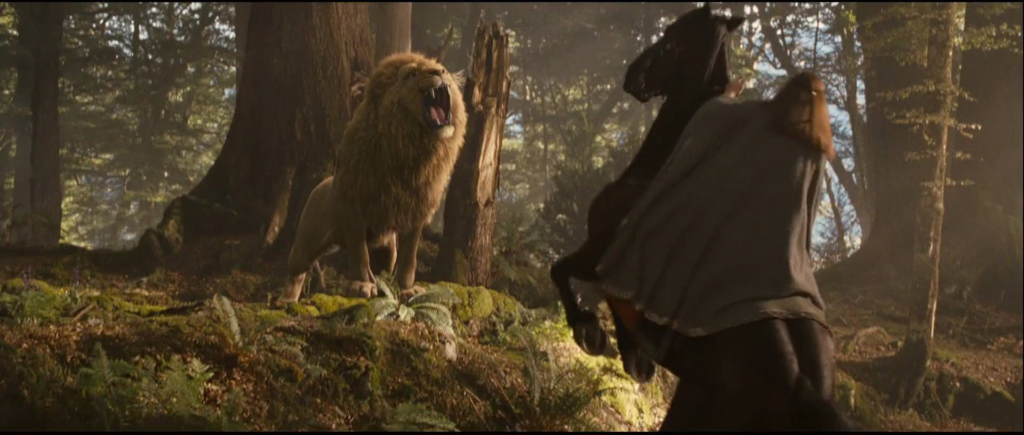
For a moment, it looks like the snarling lion is going to pounce on the fallen girl, but it leaps right over her and attacks her pursuer, knocking him off his horse. Lucy crawls to her feet in time to see the soldier running off. The lion turns to face her and, yes, it really is Aslan![1]As long we’re making the story grittier, I wouldn’t have minded Aslan killing the Telmarine. After all, he’s not like a tame lion. Lucy runs over and hugs him. The interaction between the flesh and blood actress and the CG lion is very impressive and I think Liam Neeson kicked his game up a notch as Aslan’s voice in this sequel. While saving Lucy from an attacker wasn’t from the book, I enjoy this reimagined reunion.
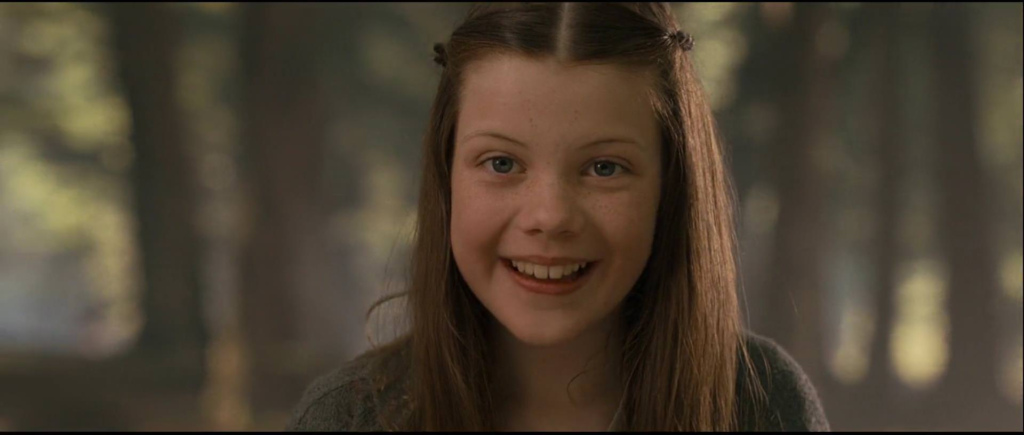
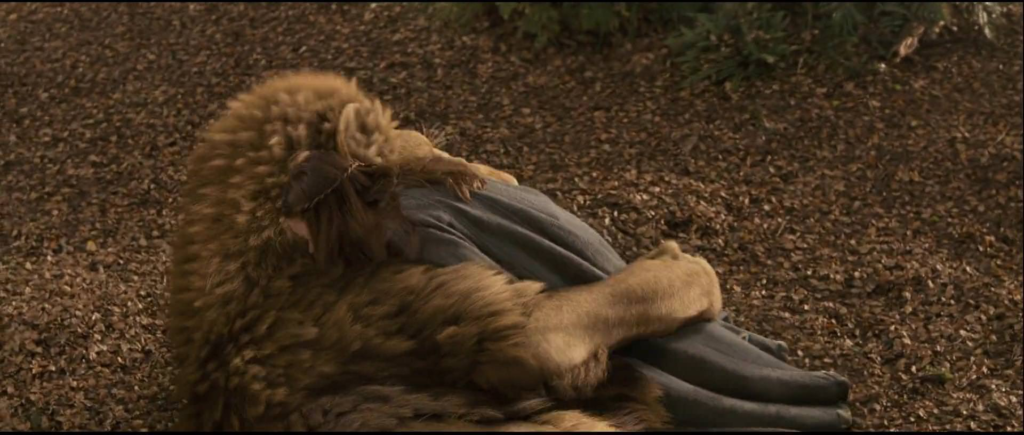
“I knew it was you!” Lucy declares ecstatically. “The whole time, I knew it! But the others didn’t believe me” to which Alsan replies, “And why would that stop you from coming to me?” Lucy’s smile fades. It’s a very nicely acted moment on Henley’s part.
Lucy: I’m sorry. I was too scared to come alone. Why wouldn’t you show yourself? Why wouldn’t you come roaring in and save us like last time?
Aslan: Things never happen the same way twice, dear one.
You may remember that Aslan said that exact same thing in his last scene with Lucy. Is the repeated line to demonstrate that that encounter wasn’t just a dream? Or did the screenwriters just forget they’d already used it? I prefer the believe the first possibility but there are enough clumsy things in these scripts that I can’t entirely discount the second one. I’ve got to say it’s a pretty ironic line to repeat if it was an accident.
Lucy: If I’d come earlier, would everyone have died? Could I have stopped that?
Aslan: We can never know what would have happened, Lucy.
Now some fans of the Narnia books, particularly Christian fans, take justifiable issue with the way that line has been adapted. In the book, Aslan says, “To know what would have happened, child? No. Nobody is ever told that.” It isn’t that Aslan himself doesn’t know; he’s just not telling. Since Aslan is meant to be God, having him say, “we can never know” is problematic from a Christian perspective. To be fair, the book doesn’t describe Aslan as omniscient outright though the longer the series goes on, the more strongly it’s implied. I believe the adaptation changed the line unthinkingly, not out of a conscious goal of keeping Aslan from being all knowing.[2]If that really was a conscious goal on their part, I’m mystified as to how they were planning to adapt The Silver Chair. Anyway, in both the book and the movie, Lucy is informed that she should have followed after Aslan despite being the only one to see him. But in the book, the Pevensies and Trumpkin still hadn’t found their way back to Aslan’s How at that point and Aslan commanded her to lead them to him. This allowed Lucy to redeem her earlier mistake though it never actually came to her leaving the others to follow Aslan by herself since they, more or less, listened to her that time. I generally approve of the way the movie restructures the book’s plot and think it makes a lot of sense but the fact that Lucy isn’t given that opportunity to redeem herself is a negative side effect of it. Still, I love that they kept Aslan calling her out on not having enough faith too, even if it no longer goes anywhere. It makes the conflict much more interesting than Lucy being totally right and her siblings being totally wrong.[3]In the book, Lucy is actually rather self-righteous when she complains to Aslan about the others not believing her and he reprimands her with a growl. The movie makes him much less stern.
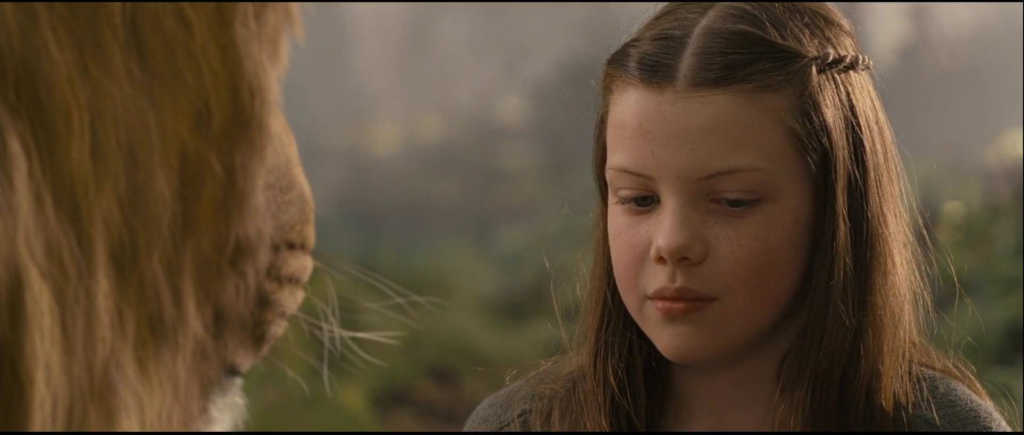
Aslan: But what will happen is another matter entirely.
Lucy: Then you’ll help?
Aslan: Of course. As will you.
Lucy: Oh, I wish I was braver.
Aslan: If you were any braver, you’d be a lioness.
This is similar to the dialogue between Lucy and Aslan in the book but less dramatic. There she actually breaks down crying but after burying her face in Aslan’s mane, she feels stronger, and he calls her a lioness. It’s a bit sad that the movie couldn’t have had that more dramatic version but since Lucy now doesn’t need to wake up four people older than her and tell them to follow someone they can’t see into the dark, it wouldn’t have felt warranted. Like I said, negative side effect of restructuring.
“Now I think your friends have slept long enough, don’t you?” says Alsan. He raises his head and roars, and the camera pans up into the tree branches. But before we can see what happens, we cut back to the battle. (Despite what you might think from my last post, I don’t mean that as a criticism.) Trumpkin, Caspian, Susan, Edmund and Peter are killing everyone who tries to kill them though it’s ambiguous how Reepicheep is faring. We see him charge under the enemy’s feet and don’t see him again for quite a while. Still, things aren’t going that well for the good guys. Caspian tumbles on his back into the pit and Glozelle points his battle axe at him. But then in the heat of battle, he hesitates. He admired the way Caspian chose to establish his kingship by rule of law rather than by killing the current occupant of the throne in the Telmarine tradition. He doesn’t feel good about killing him now. It’s a very well-acted moment for Favino.
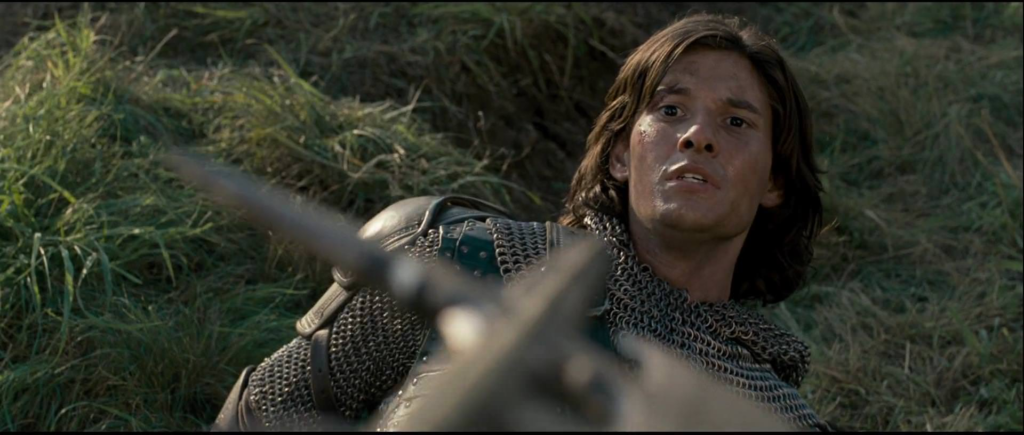
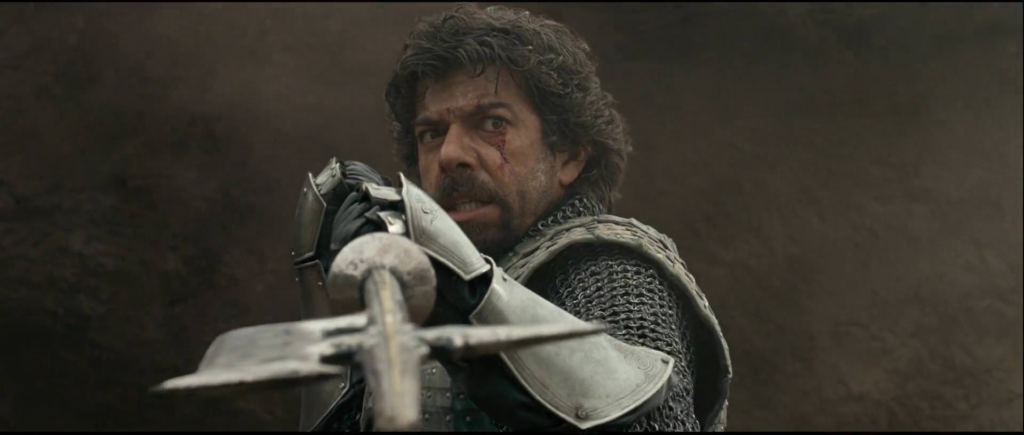
Glozelle starts to lower his weapon but before he can figure out what to do next, a giant root shoots out the ground above him, wraps itself around his waist, bangs his body around and drops it. In earlier versions of the script, this would have killed Glozelle but the filmmakers realized that having him die because he hesitated to kill our hero felt horrible wrong.[4]In the book, it’s implied that Glozelle dies at some point during this scene, but it isn’t described as is Sopespian’s death.
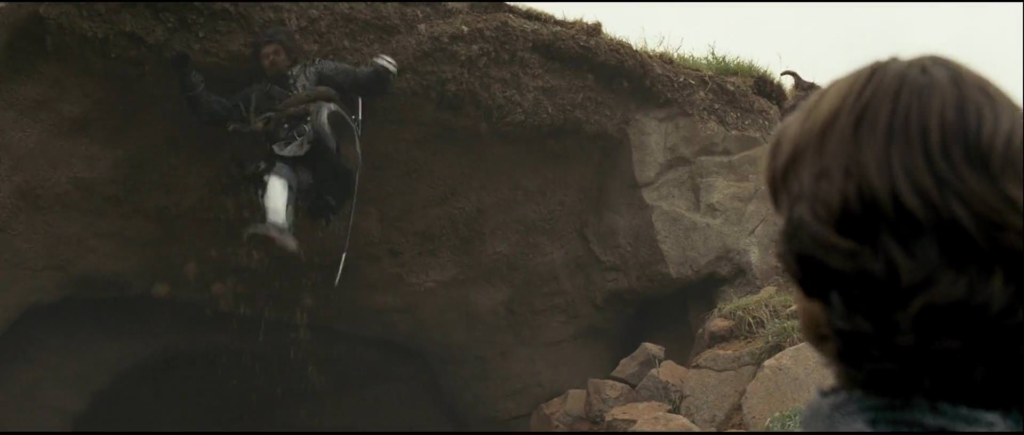
Peter helps an amazed Caspian out of the pit, and we see that the Narnians have been joined by an army of trees who walk above the ground with their giant roots acting as tentacles. One of the trees is felled by a stone from one of the catapults but another tree crushes the catapult with its roots. Peter leads the reinforced Narnians with a cry of “For Aslan!” and the terrified Telmarines turn and run. Now I know that there are critics out there who dismiss the Narnia movies, particularly this one, for ripping off The Lord of the Rings and, in this case anyway, they have a point. The climax of The Two Towers (2002) also features an army of treelike creatures defeating the technologically advanced villains. (Both stories probably owe something to Macbeth.) It doesn’t help that these trees look relatively more like the ents than the dryads in the previous Narnia film did. Still, if this is a rip-off, it’s a well done one and since The Lord of the Rings doesn’t hold the same place in my heart that it does in the hearts of many, including many Narnia fans, I’m not too bothered. In fact, I really enjoy the visual.
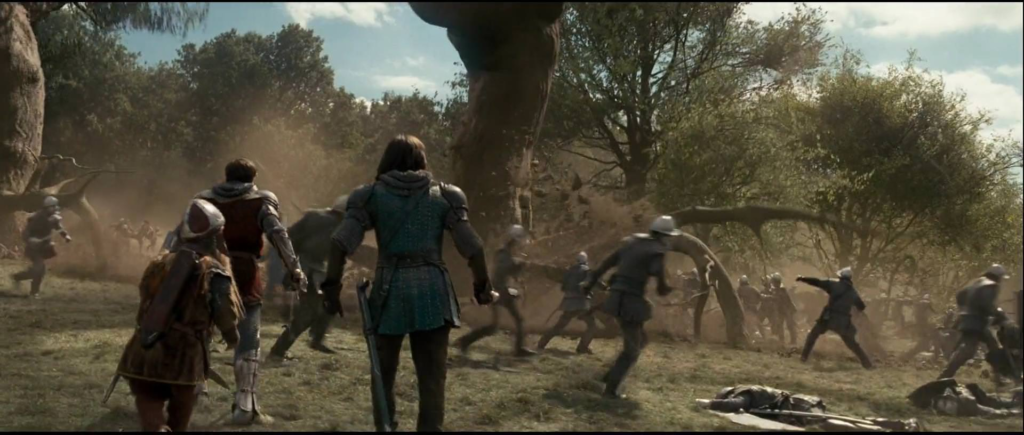

Another Telmarine tells Sopespian they can still defeat the Narnians if they draw them to the river. He orders his troops to regroup at Beruna. But there’s another surprise awaiting them. The Telmarines, pursued by the Narnians, surge toward their bridge but halt in confusion when they see Lucy, a little girl, on the other side, fearlessly walking toward them. If you’re quick-eyed, you can see Edmund smile upon seeing her even as her other siblings and the Narnians look concerned. This is very much in keeping with the book in which Edmund is the first to believe Lucy’s claims of seeing Aslan and the first besides her to gain the ability to see the lion.
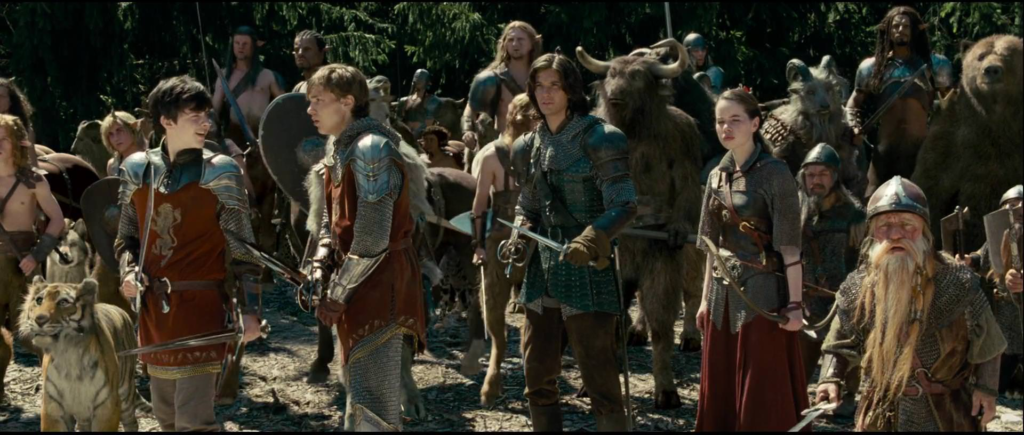
To the Telmarines’ further bafflement, Lucy smiles smugly at them and draws her dagger.
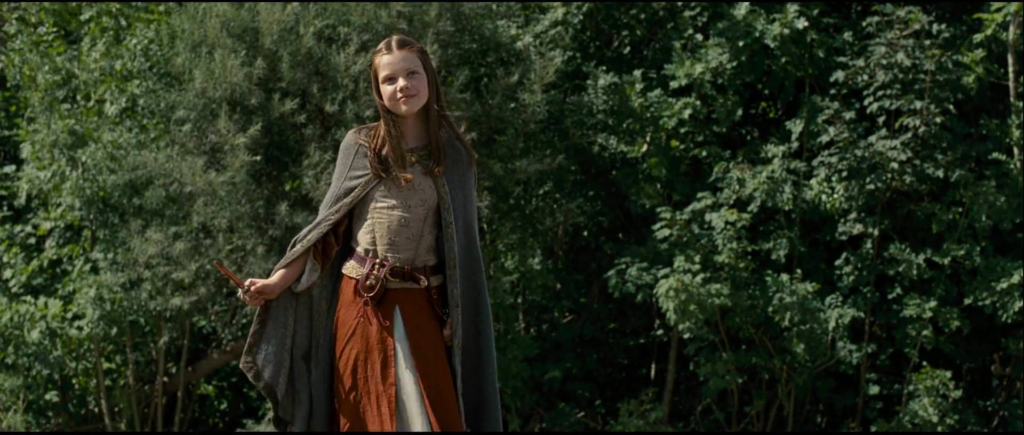
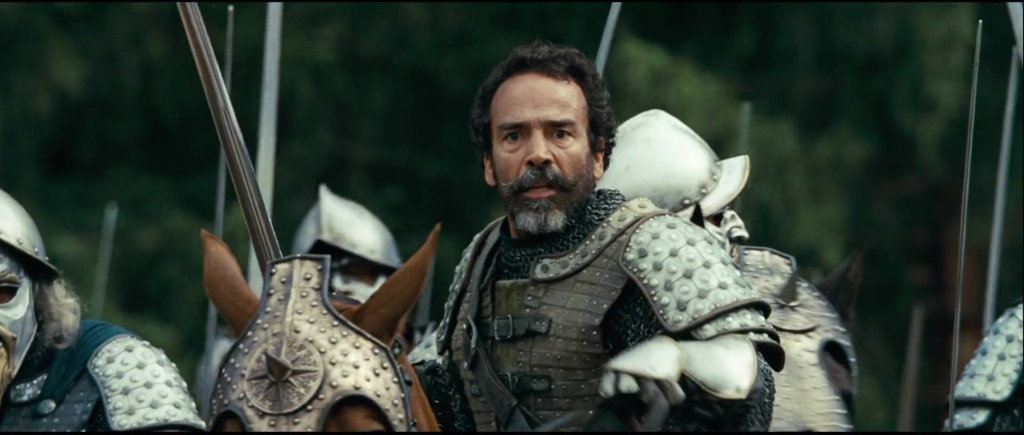
I love it!
Then Aslan calmly walks into view and stands by Lucy’s side. Sopespian leads a charge across the bridge. Other Telmarines lead their horses right into the water. Aslan roars, sending ripples across the river. Sopespian stops halfway across the bridge. Something is happening to the water. He turns to see what at first appears to be a huge wave heading towards him. Sopespian turns his horse around but it’s too late. The wave takes the form a giant man who glides across the land.[5]It’s rather reminiscent of the nature spirits from The Firebird Suite in Fantasia 2000.
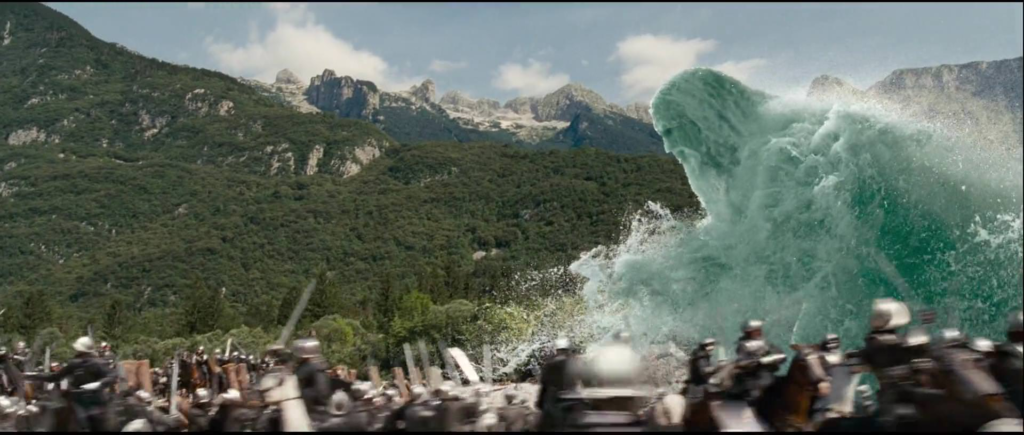
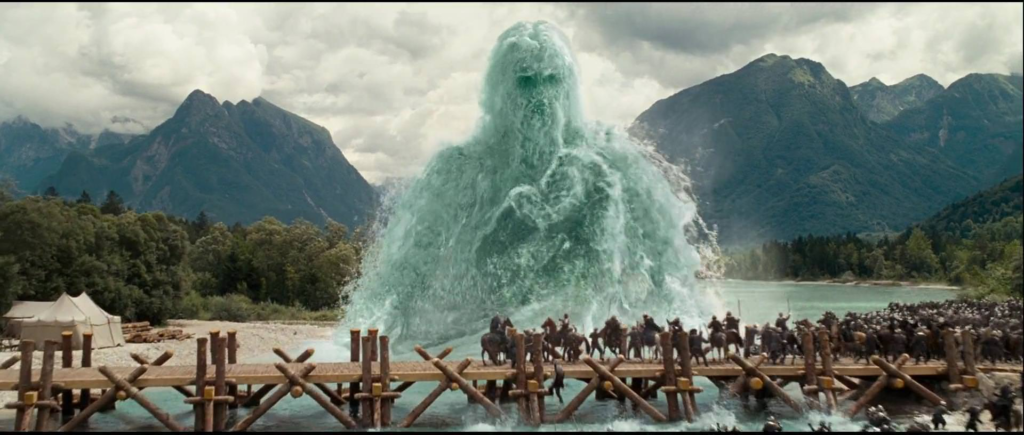
Some of the Telmarines on the bridge just scream and jump off it into the river. The towering water giant, whom the book describes as the river god, looks to Aslan who gives him a little nod. Then he lifts the bridge, with several Telmarines still on it, into the air. They all fall of except for Sopespian.
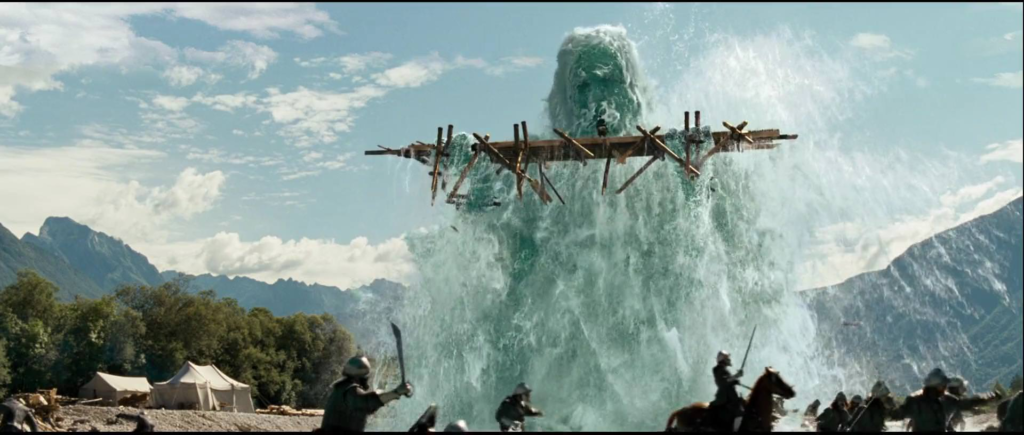
The giant glares at him. Sopespian flails his sword at him and yells in a pathetic attempt at defiance. Then the river god simply swallows him and the bridge-that’s what it looks like anyway-before collapsing into water.
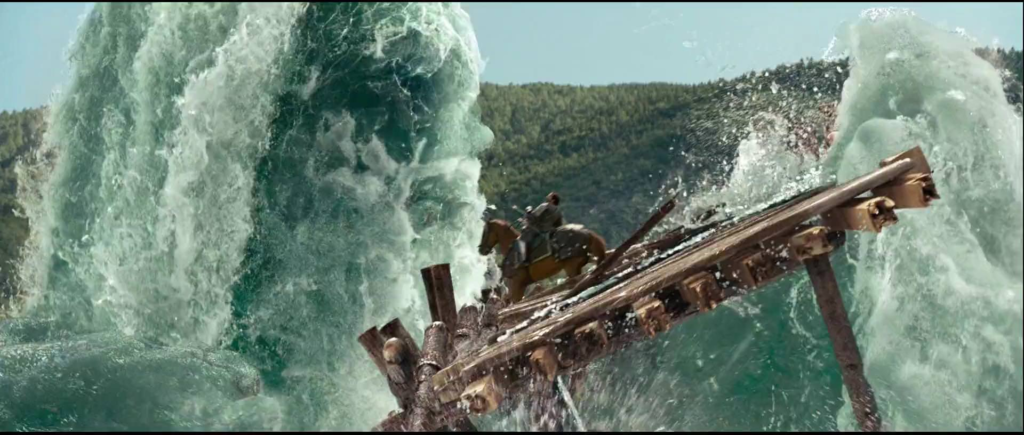
The remaining Telmarines simply hand their weapons over to the Narnians as they haul themselves out of the river. Now in the book, the river god simply asked Aslan to remove his “chains” before the Telmarines even arrived and Aslan magically made ivy destroy the bridge. The Telmarines surrendered when they found it gone. The river god never fought anyone, let alone drowned one of the story’s main villains.[6]I assume when a creature made of water devours you, you drown. I know I’m expected, as a fan of the book, to roll my eyes and complain about Hollywood making everything over the top and ridiculous but that’s not what I’m going to do. I love this reimagining of the scene and I feel it’s very true to the spirit of the book’s climax in that it’s awe-inspiring, funny and just a little bit creepy. I do think it would have worked if, as I’ve suggested before, the last movie had established this location. Then removing the bridge made by the bad guys and restoring the ford to the way it was in Narnia’s golden age would have been more emotionally resonant. But, hey, it’s still a cool scene even without that.
Another thing I’ve mentioned before is that in the book, there’s a Telmarine township near the bridge. Aslan summons Bacchus, the classical god of wine and revelry, Silenus, his mentor, and the maenads, his crazy followers. He leads them on a romp through the town, magically destroying it with greenery, and beyond. Throughout this scene, various unlikeable Telmarines flee in terror or suffer worse fates[7]This is in keeping with the myths about Bacchus punishing uptight people who refuse to join in his worship though it’s much more G-rated. while various likeable, downtrodden Telmarines (a bored schoolgirl, a weary schoolteacher, a boy being beaten by a man) happily join the merrymaking. This all culminates in a surprisingly heartwarming scene which I’m not going to spoil for anyone who hasn’t read it yet. Not everyone likes this surreal scene, but I love it.[8]Keep in mind that I probably didn’t come to the Narnia books with the same expectations as many young readers did. You see, I was a big fan of Alice’s Adventures in Wonderland and Through … Continue reading However, I’m not as upset about the movie cutting it as you’d expect though because of how much I love the reimagined river god scene. I do think cutting the unconventional conquering of Beruna and the other Telmarines towns has a negative impact on the story, but I’ll get to that in the next post.[9]I understand that nobody knows about Bacchus these days, but they could still have done the scene with just Aslan and Lucy. If nothing else, you’d think they’d have wanted to include that … Continue reading At least the movie’s version of Prince Caspian‘s climax is better than that of the 1989 BBC miniseries adaptation which omitted not only Bacchus and Silenus but the dryads and the river god. That was easily the lamest of the BBC’s Narnia adaptations.
Back to the movie. Edmund, Caspian, Peter and Susan wade across the ford and kneel before Aslan. This could just be my interpretation, not what the filmmakers intended, but they all look a little penitent. I hope it’s what the filmmakers intended because it makes sense. “Rise, Kings and Queens of Narnia,” says Aslan. Peter, Susan and Edmund do so. “All of you,” the lion adds. Caspian looks up uncertainly. “I do not think I am ready,” he says. “It’s for that very reason, I know you are,” says Aslan. In the book, what he says is “If you had felt yourself sufficient, it would have been a proof that you were not.” Personally, I think that makes more sense than the movie’s version. It’s not like a lack of confidence qualifies someone to be a good king. It’s just that overconfidence disqualifies them. But maybe I’m being too nitpicky. I really am glad the movie includes that moment from the book. Ben Barnes acts it very well and since we’ve seen the cinematic Caspian be a little cocky before, the contrast now arguably makes this an even more interesting moment than it was in the source material.
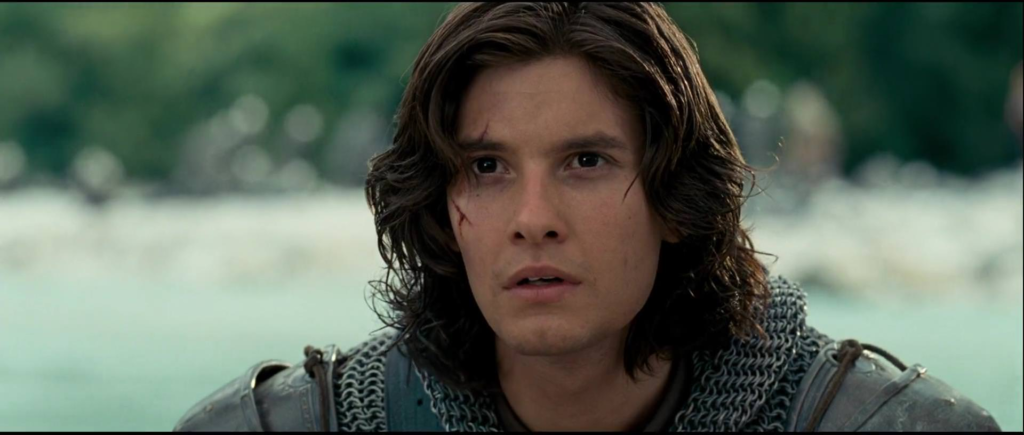
Caspian rises and the others look at him encouragingly. They are interrupted by the sound of mournful bagpipe music. The mice have brought a gravely injured Reepicheep on a stretcher and-OK, whose idea was it too play bagpipes for this bit? I know that C. S. Lewis wrote that one mouse here “piped on his slender pipe a melancholy tune” but did it have to be a bagpipe? They sound so comical, and this is supposed to be a serious moment.
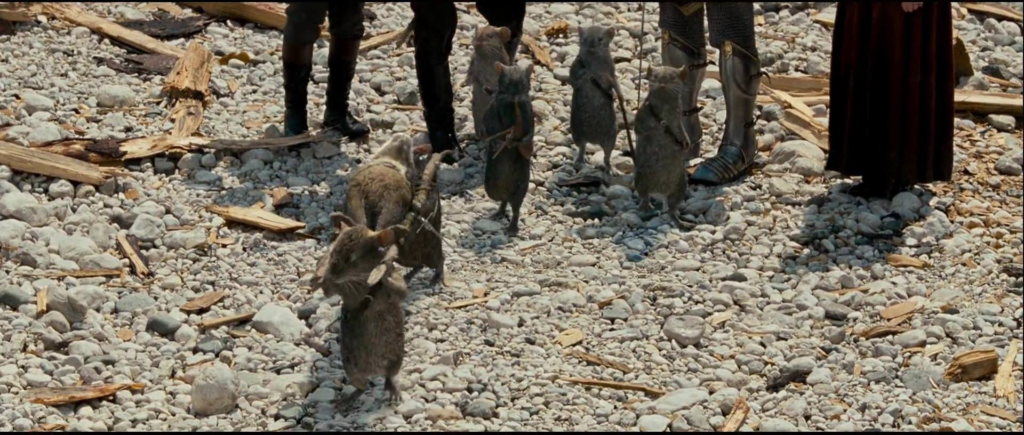
Speaking of music, this last section of the movie is one of those which mostly reuses musical theme’s from the last Narnia film’s soundtrack. It’s a bit creatively lazy on the composer’s part but I can’t complain too much since all the themes work so well in this context. Anyway, Lucy runs over and heals Reepicheep with her cordial. After a little suspense, he thanks her and rises. “Hail, Aslan,” he says, “it is a great honor to be in-” But when he tries to bow, he topples over and it’s revealed that he’s lost his tail in battle. In my experience, this is the scene that gets the biggest laughs from viewers. The animators do a great job with Reepicheep’s embarrassed body language.
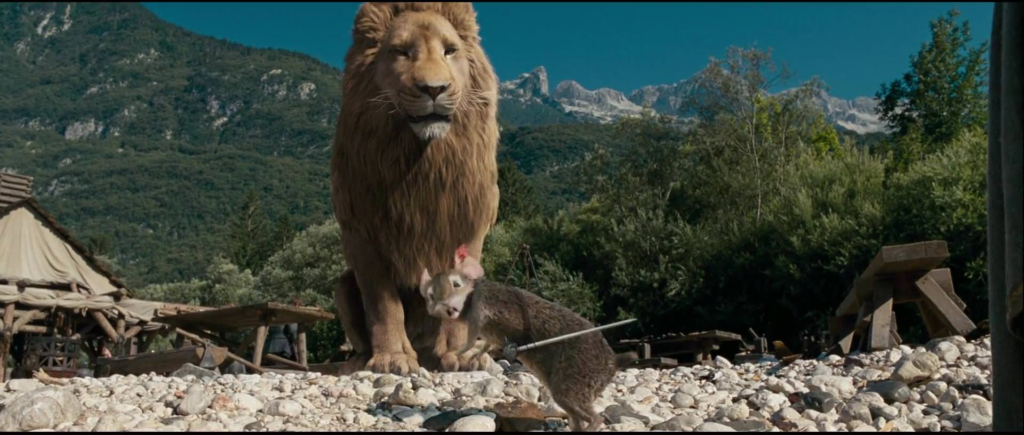
Reepicheep: I am completely out of countenance! I must crave your indulgence for appearing in this unseemly fashion! (to Lucy) Perhaps a drop more?
Lucy: I don’t think it does that.
Reepicheep: We could have a go.
Aslan (chuckling): It becomes you well, Small One.
Reepicheep (offering up his sword): All the same, great king, I regret that I must withdraw for a tail is the honor and glory of a mouse.
Aslan (a little sternly): Perhaps you think too much of your honor, friend.[10]In the book, this line is “I have sometimes wondered, friend, if you do not think too much about your honor,” implying Aslan has known Reepicheep for a while, so maybe it really was a … Continue reading
Reepicheep: Well, it’s not just the honor. It’s also great for balance and climbing and grabbing things…
Much of this is close to the book but I’m really disappointed how they changed that last line of Reepicheep’s. Here’s what C. S. Lewis wrote for him.
“Highest of all High Kings,” said Reepicheep, “permit me to remind you that a very small size has been bestowed on us Mice, and if we did not guard our dignity, some (who weigh worth by inches) would allow themselves very unsuitable pleasantries at our expense. That is why I have been at some pains to make it known that no one who does not wish to feel this sword as near his heart as I can reach shall talk in my presence about Traps or Toasted Cheese or Candles: no, Sir— not the tallest fool in Narnia!” Here he glared very fiercely up at Wimbleweather, but the Giant, who was always a stage behind everyone else, had not yet discovered what was being talked about down at his feet, and so missed the point.
That explanation for why Reepicheep is so touchy about his honor would have added a nice bit of depth to (what is in this movie) a comic relief character.[11]In the next Narnia story, Reepicheep will play a more dramatic role. And it’s not like it wouldn’t have fit with the film’s characterization. Granted it would need to be shortened a little for pacing purposes, but I can hear Eddie Izzard’s Reepicheep saying that line in my head!
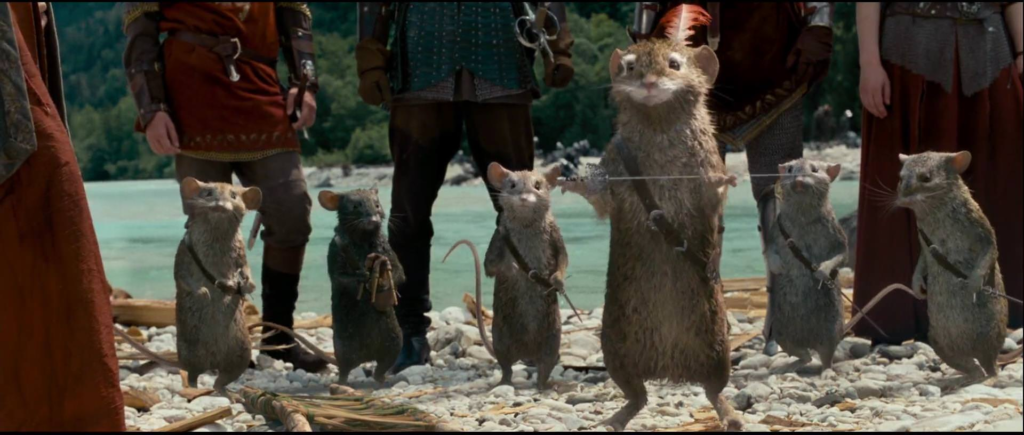
Reepicheep’s second-in-command, Peepiceek (editor Sim Evan-Jones), draws his sword and says, “May it please, Your High Majesty, we will not bear the shame of wearing an honor denied to our chief.” The other mice follow suit and make ready to cut their own tails off. This does not get laughs from viewers in my experience and nor should it get them since this a serious and rather heartwarming moment.
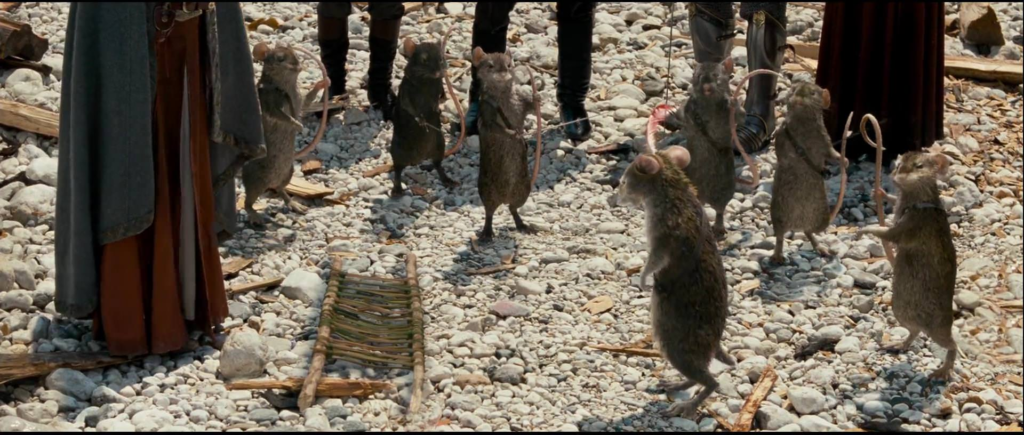
“Not for the sake of your dignity but for the love of your people,” says Aslan and Reepicheep’s tail grows back in an instant. (In the book, Aslan gave another reason for restoring the tail. I’d have loved it if that had been kept but I guess I can live without it. It serves as a nice surprise for people who read the book after watching the film, I imagine.) “Thank you! Thank you, my liege!” says Reepicheep. “I will treasure it always! From this day forward, it will serve as a great reminder of my huge humility!” Did the movie have to add that last bit? I do consider Reepicheep an amusing character[12]If you don’t believe me, check out Lewis’s description of him realizing his tail is missing or read about his chess skills-or lack thereof-in The Voyage of the Dawn Treader. but he’s far from just a caricature and even putting that aside, jokes about people being proud of being humble are so old.[13]To be fair, they’re probably old because taking pride in one’s humility is depressingly common in real life. We didn’t need another one. However, I’m making it sound like I love this little vignette in the movie much less than I do. I’m really grateful to the adaptation for including it when it’s not necessary to the story[14]I imagine they were motivated by knowing the large role Reepicheep would play in their series’ next installment. and while it’s not as great as in the book, it’s still pretty great.
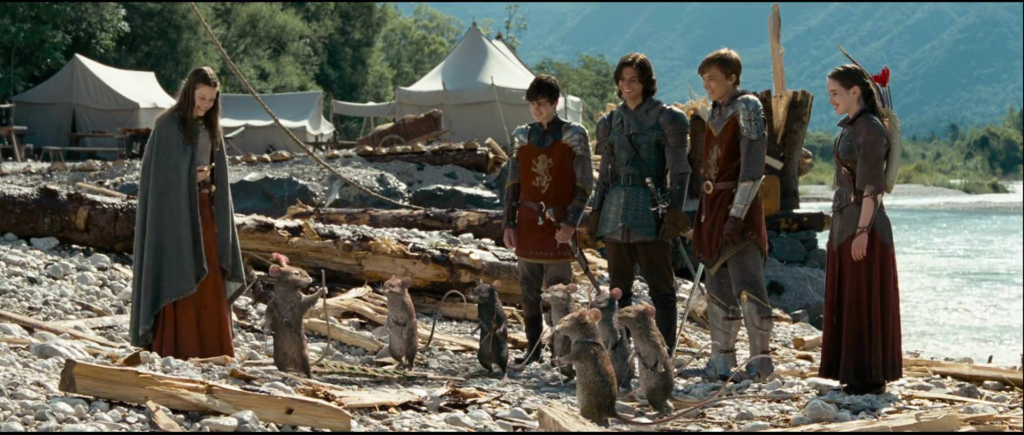
“Now where is this ‘dear little friend’ you’ve told me so much about?” Aslan asks Lucy. Everyone looks at Trumpkin who is supervising the surrendering Telmarines nearby. He’s also keeping one very wary eye on Aslan. Seeing that he’s wanted, he nervously approaches him and kneels. Aslan gives a great roar which makes the dwarf shudder. If all this sounds scary, I’m doing a bad job with the description. It’s actually quite funny. “Do you see him now?” asks Lucy. Trumpkin manages a weak smile. When I first saw this scene, I was disappointed that Aslan didn’t pick Trumpkin up in his mouth, shake him, toss him in the air and then gently set him down as in the book. But I understand that would have been hard from a technical standpoint and I’ve come to appreciate this quieter version. Peter Dinklage’s little smile is perfect, conveying that Trumpkin now has a healthy fear of Aslan but that they’re also friends now.
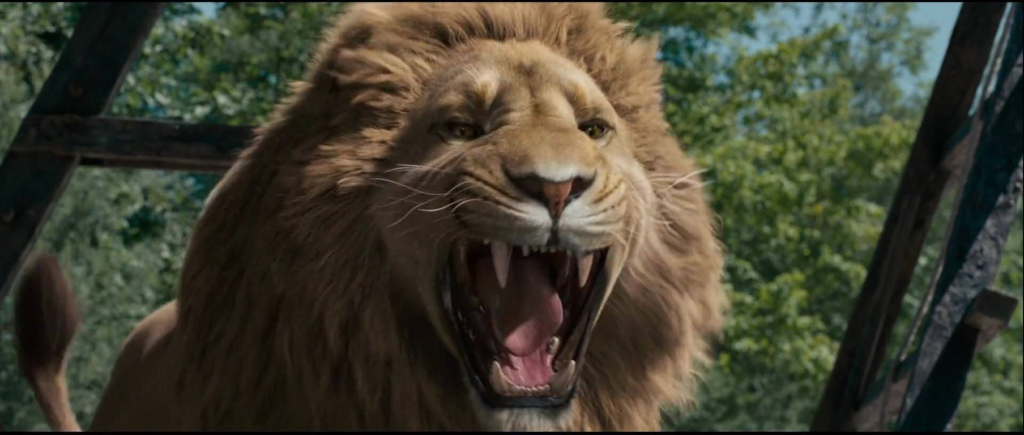
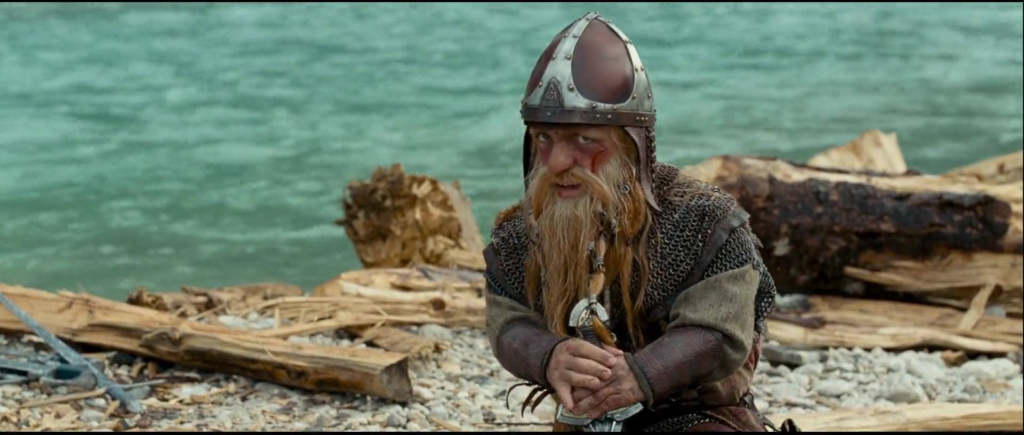
Next Week: Aslan Makes a Door in the Air
References
| ↑1 | As long we’re making the story grittier, I wouldn’t have minded Aslan killing the Telmarine. After all, he’s not like a tame lion. |
|---|---|
| ↑2 | If that really was a conscious goal on their part, I’m mystified as to how they were planning to adapt The Silver Chair. |
| ↑3 | In the book, Lucy is actually rather self-righteous when she complains to Aslan about the others not believing her and he reprimands her with a growl. The movie makes him much less stern. |
| ↑4 | In the book, it’s implied that Glozelle dies at some point during this scene, but it isn’t described as is Sopespian’s death. |
| ↑5 | It’s rather reminiscent of the nature spirits from The Firebird Suite in Fantasia 2000. |
| ↑6 | I assume when a creature made of water devours you, you drown. |
| ↑7 | This is in keeping with the myths about Bacchus punishing uptight people who refuse to join in his worship though it’s much more G-rated. |
| ↑8 | Keep in mind that I probably didn’t come to the Narnia books with the same expectations as many young readers did. You see, I was a big fan of Alice’s Adventures in Wonderland and Through the Looking Glass and What Alice Found There by Lewis Carroll growing up. To a lesser extent, I was a fan of the Wayside School books by Louis Sachar. I went to fantasy for surreal silliness more than I went to it for stories about epic clashes between good and evil. I was also a fan of Greek mythology. All of which means the scene at Beruna in Prince Caspian probably plays better for me than it does for the average Narnia fan. |
| ↑9 | I understand that nobody knows about Bacchus these days, but they could still have done the scene with just Aslan and Lucy. If nothing else, you’d think they’d have wanted to include that heartwarming climax I mentioned! |
| ↑10 | In the book, this line is “I have sometimes wondered, friend, if you do not think too much about your honor,” implying Aslan has known Reepicheep for a while, so maybe it really was a conscious goal of the screenwriters to avoid Aslan being all-knowing. |
| ↑11 | In the next Narnia story, Reepicheep will play a more dramatic role. |
| ↑12 | If you don’t believe me, check out Lewis’s description of him realizing his tail is missing or read about his chess skills-or lack thereof-in The Voyage of the Dawn Treader. |
| ↑13 | To be fair, they’re probably old because taking pride in one’s humility is depressingly common in real life. |
| ↑14 | I imagine they were motivated by knowing the large role Reepicheep would play in their series’ next installment. |
